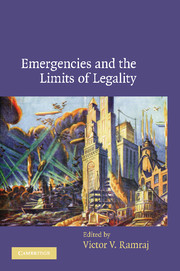Book contents
- Frontmatter
- Contents
- List of contributors
- Preface
- Introduction
- PART ONE Legality and extra-legality
- 2 The compulsion of legality
- 3 Extra-legality and the ethic of political responsibility
- PART TWO Conceptual and normative theories
- PART THREE Political and sociological theories
- PART FOUR Prospective constraints on state power
- PART FIVE Judicial responses to official disobedience
- PART SIX Post-colonial and international perspectives
- Index
- References
2 - The compulsion of legality
Published online by Cambridge University Press: 10 August 2009
- Frontmatter
- Contents
- List of contributors
- Preface
- Introduction
- PART ONE Legality and extra-legality
- 2 The compulsion of legality
- 3 Extra-legality and the ethic of political responsibility
- PART TWO Conceptual and normative theories
- PART THREE Political and sociological theories
- PART FOUR Prospective constraints on state power
- PART FIVE Judicial responses to official disobedience
- PART SIX Post-colonial and international perspectives
- Index
- References
Summary
Introduction
According to Carl Schmitt, the limits of law exposed by emergencies debunk not only legal theory, but also what we might think of as the political theory of liberal democracy, since Schmitt rightly took liberal democracy to be committed to the rule of law. The considerable theoretical interest of Oren Gross's extra-legal measures model of how a liberal democratic state should respond to an emergency lies in how he might be said to turn Schmitt's claim that the ‘exception proves everything’ to liberalism's advantage. Gross's argument is that one can and should accept Schmitt's claim that a state of emergency exposes the limits of law. Nevertheless, the extra-legal measures model, in showing why it is appropriate for the executive to respond illegally in catastrophic situations, not only leaves liberal democracy and the rule of law intact, but even strengthened.
I will argue that unless we commit to governing through law in an emergency, we are forced into one of two unsatisfactory positions. The ‘internal realist’ position undermines law's claim to authority by creating a veneer of legality over what is really the exercise of power by the political elite, while the ‘external realist’ position suggests that the sovereign's power is not ultimately constrained by law.
- Type
- Chapter
- Information
- Emergencies and the Limits of Legality , pp. 33 - 59Publisher: Cambridge University PressPrint publication year: 2008
References
- 17
- Cited by



